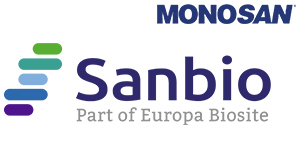Mouse anti-MDM2, clone SMP14 (Monoclonal)
Mouse anti-MDM2, clone SMP14 (Monoclonal)
SKU
SANMON10220
Packaging Unit
1 ml
Manufacturer
Sanbio / Monosan
Availability:
loading...
Price is loading...
Clone Number: SMP14
Immunogen: Human MDM2 aa. 154-167
Concentration: n/a
Format: Purified
Storage buffer: Affinity purified antibody in aqueous buffered solution containing ≤0.09% sodium azide
Additional info: The expression of MDM2 is itself, induced by p53 and may be a way for p53 to self-regulate its activity during the normal cell cycle. However, overexpression of MDM2 results in the loss of p53-regulated growth control and consequently, deregulated cell proliferation. MDM2 also binds to the Retinoblastoma tumor suppressor protein (Rb) and inhibits its growth regulatory function. MDM2 can directly augment proliferation by binding to two transcription factors E2F1 and DP1 and stimulating the activity of the S-phase inducing E2F1/DP1 heterodimer. MDM2 migrates at a reduced molecular weight of ~95 kDa. The SMP14 clone has been reported to recognize human, mouse and rat MDM2 while exhibiting a slight cross-reactivity with cytokeratin’s 6, 14 and 16 in some experimental systems. In the immunoprecipitation application, SMP14 has been reported to precipitate MDM2 and p53-MDM2 complexes. MCF7 human breast carcinoma cells (ATCC HTB-22) and NIH/3T3 mouse fibroblasts (ATCC CRL-1658) are suggested as western blot and immunoprecipitation positive controls. SMP14 has been reported to be useful for the immunohistochemical staining of acetone-fixed, frozen sections and of formalin-fixed, paraffin-embedded tissue sections. In addition to a nuclear staining of MDM2, cytoplasmic staining may also be observed which is likely to be attributable to the slight cross reactivity of the SMP14 clone with cytokeratin’s. Control tisse Breat carcinoma. Staining Nuclear
References: Martin K, et al, Nature, 1995; 375(6533):691-694./Picksley SM, et al, Oncogene, 1994; 9(9):2523-2529.
Immunogen: Human MDM2 aa. 154-167
Concentration: n/a
Format: Purified
Storage buffer: Affinity purified antibody in aqueous buffered solution containing ≤0.09% sodium azide
Additional info: The expression of MDM2 is itself, induced by p53 and may be a way for p53 to self-regulate its activity during the normal cell cycle. However, overexpression of MDM2 results in the loss of p53-regulated growth control and consequently, deregulated cell proliferation. MDM2 also binds to the Retinoblastoma tumor suppressor protein (Rb) and inhibits its growth regulatory function. MDM2 can directly augment proliferation by binding to two transcription factors E2F1 and DP1 and stimulating the activity of the S-phase inducing E2F1/DP1 heterodimer. MDM2 migrates at a reduced molecular weight of ~95 kDa. The SMP14 clone has been reported to recognize human, mouse and rat MDM2 while exhibiting a slight cross-reactivity with cytokeratin’s 6, 14 and 16 in some experimental systems. In the immunoprecipitation application, SMP14 has been reported to precipitate MDM2 and p53-MDM2 complexes. MCF7 human breast carcinoma cells (ATCC HTB-22) and NIH/3T3 mouse fibroblasts (ATCC CRL-1658) are suggested as western blot and immunoprecipitation positive controls. SMP14 has been reported to be useful for the immunohistochemical staining of acetone-fixed, frozen sections and of formalin-fixed, paraffin-embedded tissue sections. In addition to a nuclear staining of MDM2, cytoplasmic staining may also be observed which is likely to be attributable to the slight cross reactivity of the SMP14 clone with cytokeratin’s. Control tisse Breat carcinoma. Staining Nuclear
References: Martin K, et al, Nature, 1995; 375(6533):691-694./Picksley SM, et al, Oncogene, 1994; 9(9):2523-2529.
| SKU | SANMON10220 |
|---|---|
| Manufacturer | Sanbio / Monosan |
| Manufacturer SKU | MON10220 |
| Package Unit | 1 ml |
| Quantity Unit | STK |
| Reactivity | Human, Mouse (Murine), Rat (Rattus) |
| Clonality | Monoclonal |
| Application | Immunohistochemistry (frozen), Immunohistochemistry (paraffin), Western Blotting |
| Isotype | IgG1 |
| Host | Mouse |
| Conjugate | Unconjugated |
| Product information (PDF) | Download |
| MSDS (PDF) |
|

 Deutsch
Deutsch







